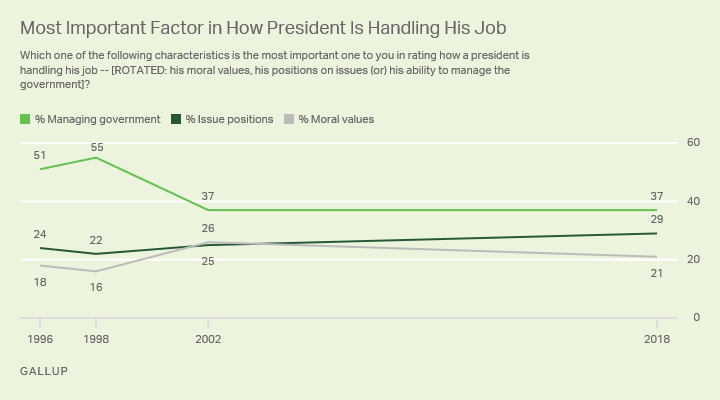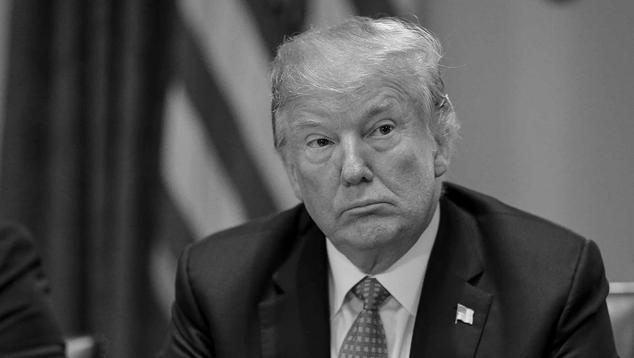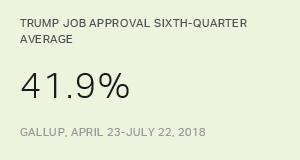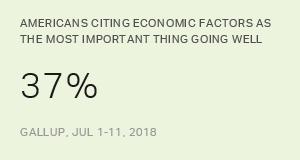Story Highlights
- 37% say managerial ability is most important in evaluating president
- In 1990s, majorities said managing government was most important
- Republicans less likely than previously to say moral values are important
WASHINGTON, D.C. -- Americans are most likely to say a president's ability to manage the government is the biggest factor in their evaluations of him, of three possible leadership characteristics. Thirty-seven percent choose government management, while 29% say the president's issue positions are most important and 21% say his moral values. This division is similar to what Gallup measured during George W. Bush's presidency but is significantly less tilted toward managing government than was the case during Bill Clinton's years in office, when majorities selected this trait.

With the decline in perceived importance of managing the government between the Clinton and Bush presidencies, the percentages citing moral values or issue positions as most important increased. Gallup did not ask the question during Barack Obama's presidency.
The latest results are based on a July 30-Aug. 5 poll. President Donald Trump currently has a 41% job approval rating among all U.S. adults.
Republicans, Democrats and independents choose a president's ability to manage the government over the other dimensions as most important. At 42%, Republicans are more likely than other groups to choose managing the government, and they are least likely to choose moral values (14%). One in four Democrats and independents say moral values are most important.
| Managing the government | Issue positions | Moral values | |||||||||||||||||||||||||||||||||||||||||||||||||||||||||||||||||||||||||||||||||||||||||||||||||
|---|---|---|---|---|---|---|---|---|---|---|---|---|---|---|---|---|---|---|---|---|---|---|---|---|---|---|---|---|---|---|---|---|---|---|---|---|---|---|---|---|---|---|---|---|---|---|---|---|---|---|---|---|---|---|---|---|---|---|---|---|---|---|---|---|---|---|---|---|---|---|---|---|---|---|---|---|---|---|---|---|---|---|---|---|---|---|---|---|---|---|---|---|---|---|---|---|---|---|---|
| % | % | % | |||||||||||||||||||||||||||||||||||||||||||||||||||||||||||||||||||||||||||||||||||||||||||||||||
| Republicans | 42 | 33 | 14 | ||||||||||||||||||||||||||||||||||||||||||||||||||||||||||||||||||||||||||||||||||||||||||||||||
| Independents | 35 | 30 | 24 | ||||||||||||||||||||||||||||||||||||||||||||||||||||||||||||||||||||||||||||||||||||||||||||||||
| Democrats | 34 | 25 | 24 | ||||||||||||||||||||||||||||||||||||||||||||||||||||||||||||||||||||||||||||||||||||||||||||||||
| Gallup, July 30-Aug. 5, 2018 | |||||||||||||||||||||||||||||||||||||||||||||||||||||||||||||||||||||||||||||||||||||||||||||||||||
Republicans Put Less Emphasis on Moral Values in Trump Administration
Republicans' current criteria for evaluating presidents differ from what they have been in the past. Most notably, the 14% who say moral values are most important in how they view a president is down sharply from the 36% who said this in 2002, when George W. Bush was president, and is significantly lower than the roughly 25% who did so under Bill Clinton in the 1990s. Results from a May 2018 Gallup poll underscore this shift, finding fewer Republicans now than in the 1990s saying it is important for a president to provide strong moral leadership.
Meanwhile, the 33% of Republicans assigning the greatest importance to issue positions is the highest for the group to date by 11 percentage points. Republicans who may have reservations about Trump's leadership style or the controversies surrounding him may gravitate toward saying his stance on issues is more important, given their likely agreement with Trump's views on taxes, abortion and immigration.
The 42% of Republicans who say a president's ability to manage the government is paramount in evaluating his performance matches the average for the three polls conducted between 1996 and 2002.
| Managing the government | Issue positions | Moral values | ||||||||||||||||||||||||||||||||||||||||||||||||||||||||||||||||||||||||||||||||||||||||||||||||||
|---|---|---|---|---|---|---|---|---|---|---|---|---|---|---|---|---|---|---|---|---|---|---|---|---|---|---|---|---|---|---|---|---|---|---|---|---|---|---|---|---|---|---|---|---|---|---|---|---|---|---|---|---|---|---|---|---|---|---|---|---|---|---|---|---|---|---|---|---|---|---|---|---|---|---|---|---|---|---|---|---|---|---|---|---|---|---|---|---|---|---|---|---|---|---|---|---|---|---|---|---|
| % | % | % | ||||||||||||||||||||||||||||||||||||||||||||||||||||||||||||||||||||||||||||||||||||||||||||||||||
| Republicans | ||||||||||||||||||||||||||||||||||||||||||||||||||||||||||||||||||||||||||||||||||||||||||||||||||||
| 2018 | 42 | 33 | 14 | |||||||||||||||||||||||||||||||||||||||||||||||||||||||||||||||||||||||||||||||||||||||||||||||||
| 2002 | 32 | 19 | 36 | |||||||||||||||||||||||||||||||||||||||||||||||||||||||||||||||||||||||||||||||||||||||||||||||||
| 1998 | 45 | 18 | 27 | |||||||||||||||||||||||||||||||||||||||||||||||||||||||||||||||||||||||||||||||||||||||||||||||||
| 1996 | 48 | 22 | 23 | |||||||||||||||||||||||||||||||||||||||||||||||||||||||||||||||||||||||||||||||||||||||||||||||||
| Independents | ||||||||||||||||||||||||||||||||||||||||||||||||||||||||||||||||||||||||||||||||||||||||||||||||||||
| 2018 | 35 | 30 | 24 | |||||||||||||||||||||||||||||||||||||||||||||||||||||||||||||||||||||||||||||||||||||||||||||||||
| 2002 | 36 | 29 | 23 | |||||||||||||||||||||||||||||||||||||||||||||||||||||||||||||||||||||||||||||||||||||||||||||||||
| 1998 | 53 | 25 | 15 | |||||||||||||||||||||||||||||||||||||||||||||||||||||||||||||||||||||||||||||||||||||||||||||||||
| 1996 | 55 | 20 | 18 | |||||||||||||||||||||||||||||||||||||||||||||||||||||||||||||||||||||||||||||||||||||||||||||||||
| Democrats | ||||||||||||||||||||||||||||||||||||||||||||||||||||||||||||||||||||||||||||||||||||||||||||||||||||
| 2018 | 34 | 25 | 24 | |||||||||||||||||||||||||||||||||||||||||||||||||||||||||||||||||||||||||||||||||||||||||||||||||
| 2002 | 44 | 29 | 17 | |||||||||||||||||||||||||||||||||||||||||||||||||||||||||||||||||||||||||||||||||||||||||||||||||
| 1998 | 64 | 23 | 8 | |||||||||||||||||||||||||||||||||||||||||||||||||||||||||||||||||||||||||||||||||||||||||||||||||
| 1996 | 50 | 28 | 15 | |||||||||||||||||||||||||||||||||||||||||||||||||||||||||||||||||||||||||||||||||||||||||||||||||
| Gallup | ||||||||||||||||||||||||||||||||||||||||||||||||||||||||||||||||||||||||||||||||||||||||||||||||||||
At the same time that Republicans are putting less emphasis on moral values, Democrats are placing more emphasis on that dimension than they did in the past. This is also consistent with the May survey that found an increase from the Clinton years in the percentage of Democrats saying it is important for a president to provide moral leadership.
Democrats are much less likely now to emphasize a president's ability to manage the government than they were under Bush and, especially, Clinton.
These party shifts provide some evidence that Republicans' and Democrats' criteria for evaluating presidents are influenced by the relative strengths and weaknesses of the sitting president. Democrats, who were inclined to support Clinton, gave more weight to managing the government and less to moral values when he was presiding over a strong economy but was tainted by personal scandals. Republicans appear to minimize the importance of moral values under Trump but said these were more important than the other factors when Bush was president.
Independents, like Democrats, are much less likely to say government management is the key factor for them in evaluating presidents than they were under Clinton. Their opinions today, however, are nearly identical to what they were in 2002, appearing to be less influenced by personal differences between Bush and Trump.
Importance of Moral Values Key Indicator of Trump Job Approval
The May survey found 40% of Americans saying Trump provides strong moral leadership and 59% weak moral leadership. Those who say moral values are most important for a president in the current survey appear to be critical of Trump in this regard. As such, there is a strong relationship between importance of moral values and Trump's job approval rating -- 25% who say moral values are most important approve of the job he is doing, while 71% disapprove, including 54% who disapprove strongly. Those who regard issue positions or ability to manage the government as the most important factors are about as likely to approve as to disapprove of Trump.
| Managing the government | Issue positions | Moral values | |||||||||||||||||||||||||||||||||||||||||||||||||||||||||||||||||||||||||||||||||||||||||||||||||
|---|---|---|---|---|---|---|---|---|---|---|---|---|---|---|---|---|---|---|---|---|---|---|---|---|---|---|---|---|---|---|---|---|---|---|---|---|---|---|---|---|---|---|---|---|---|---|---|---|---|---|---|---|---|---|---|---|---|---|---|---|---|---|---|---|---|---|---|---|---|---|---|---|---|---|---|---|---|---|---|---|---|---|---|---|---|---|---|---|---|---|---|---|---|---|---|---|---|---|---|
| % | % | % | |||||||||||||||||||||||||||||||||||||||||||||||||||||||||||||||||||||||||||||||||||||||||||||||||
| Strongly approve | 29 | 35 | 12 | ||||||||||||||||||||||||||||||||||||||||||||||||||||||||||||||||||||||||||||||||||||||||||||||||
| Moderately approve | 18 | 14 | 13 | ||||||||||||||||||||||||||||||||||||||||||||||||||||||||||||||||||||||||||||||||||||||||||||||||
| Moderately disapprove | 13 | 9 | 17 | ||||||||||||||||||||||||||||||||||||||||||||||||||||||||||||||||||||||||||||||||||||||||||||||||
| Strongly disapprove | 39 | 40 | 54 | ||||||||||||||||||||||||||||||||||||||||||||||||||||||||||||||||||||||||||||||||||||||||||||||||
| Total approve | 47 | 49 | 25 | ||||||||||||||||||||||||||||||||||||||||||||||||||||||||||||||||||||||||||||||||||||||||||||||||
| Total disapprove | 52 | 49 | 71 | ||||||||||||||||||||||||||||||||||||||||||||||||||||||||||||||||||||||||||||||||||||||||||||||||
| Gallup, July 30-Aug. 5, 2018 | |||||||||||||||||||||||||||||||||||||||||||||||||||||||||||||||||||||||||||||||||||||||||||||||||||
Americans who regarded moral values as the most important criterion for evaluating a president were also quite negative about Clinton's performance in office, but not quite as negative as they are about Trump. In both the 1996 and 1998 surveys, 34% of those who said moral values were most important approved of Clinton, while an average of 60% across the two surveys disapproved. Clinton's job approval among all Americans in those surveys averaged 62%.
By contrast, in 2002, those who said moral values were most important gave Bush higher approval (86%) than did Americans overall (77%), suggesting they thought Bush had strong morals.
Implications
Americans are most inclined to say they base their opinions of the president on how he is managing the government, but the percentage who do so is lower now than in the 1990s. More say a president's issue positions and moral values are paramount in their evaluations of him than was true in the past.
These developments are consistent with the trend toward increasingly partisan views of presidents. More people now approve or disapprove of the president based on fundamental and unchanging aspects of the president than on an evaluation of how he, or the country, is faring at a given time. This broader pattern helps explain the lack of a honeymoon period for Trump. It also explains the lack of big rallies in approval of Trump, and of Barack Obama, in response to important international or domestic events -- a historical staple of presidential approval ratings.
The data presented here also suggest that Americans' beliefs about what is most important in evaluating a president are not fixed. In particular, partisans' evaluative criteria appear to shift to fit the strengths -- or weaknesses -- of the incumbent, and to better align with their inclination to support a president of their own party and oppose a president of the other party.
Explore President Trump's approval ratings and compare them with those of past presidents in the Gallup Presidential Job Approval Center.
Survey Methods
Results for this Gallup poll are based on telephone interviews conducted July 30-Aug. 5, 2018, on the Gallup U.S. Poll, with a random sample of 1,505 adults, aged 18 and older, living in all 50 U.S. states and the District of Columbia. For results based on the total sample of national adults, the margin of sampling error is ±3 percentage points at the 95% confidence level. All reported margins of sampling error include computed design effects for weighting.
Each sample of national adults includes a minimum quota of 70% cellphone respondents and 30% landline respondents, with additional minimum quotas by time zone within region. Landline and cellular telephone numbers are selected using random-digit-dial methods.
View survey methodology, complete question responses and trends.
Learn more about how the Gallup U.S. Poll works.




